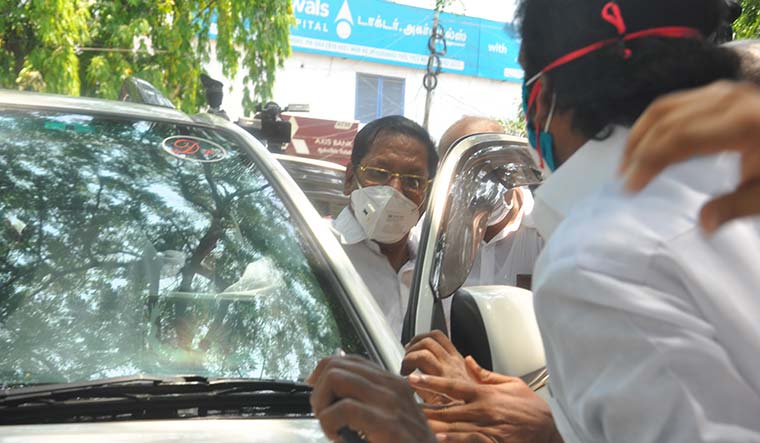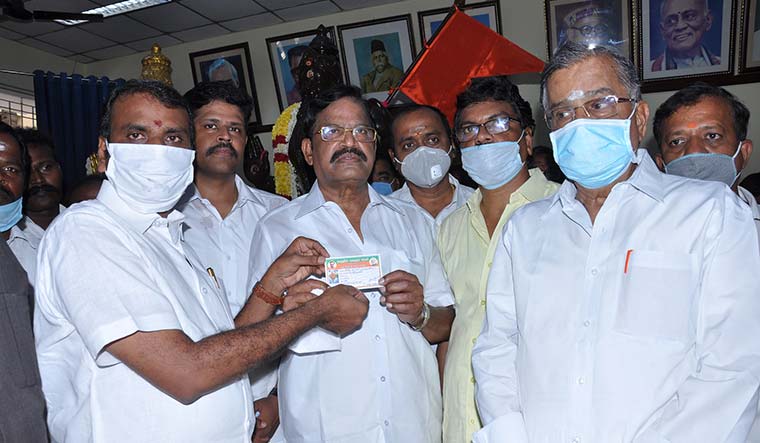NEWS IN THE past few days has been bad for the DMK. On May 23, the party’s organising secretary and Rajya Sabha member R.S. Bharathi was arrested from his Chennai residence for allegedly belittling dalits. In a speech at the party’s youth wing office in Chennai on February 14, Bharathi reportedly said many dalits could become judges because of alms given by the dravidian movement. He was booked under the Scheduled Castes and Scheduled Tribes (Prevention of Atrocities) Act, 1989, after a dalit activist lodged a complaint in May. A local court later granted him interim bail till June 1.
Hours after he was released, party MPs Dayanidhi Maran and T.R. Baalu rushed to the Madras High Court seeking anticipatory bail in a similar case. Maran and Baalu had met Tamil Nadu chief secretary K. Shanmugam on May 13 to discuss the party’s Covid-19 relief initiative, Ondrinaivam Vaa (the togetherness campaign). After the meeting, they alleged that Shanmugam had treated them like “third-class people”. “We were treated like oppressed people,” Maran told reporters. “People like you—are we oppressed people?”
The comments provoked a furious backlash. Maran was criticised for comparing his meeting with the chief secretary to the plight of dalits. Five days later, first information reports under the SC/ST Act were registered against the leaders across several districts. The High Court later restrained the police from taking “coercive action” against Maran and Baalu, and gave a week for the government to file a detailed reply on the FIRs.
The same day, a case against DMK legislator Senthil Balaji—for allegedly threatening Karur district collector K. Anbalagan—was transferred to the crime branch criminal investigation department. A former AIADMK minister, Balaji defected to the DMK in 2018 and is now close to the party chief and opposition leader M.K. Stalin and his family.
The series of setbacks began after rebel DMK leader V.P. Duraisamy met state BJP president L. Murugan on May 18. Duraisamy said the meeting was a “courtesy call” and that he was not planning to join the BJP. “But you cannot predict anything in politics,” he said.
Both Duraisamy and Murugan are dalits, and they had contested the 2016 assembly elections against each other. Duraisamy was deputy speaker in the assembly from 2006 to 2011. He was replaced by Andhiyur Selvaraj, who is also dalit, as the DMK’s deputy general secretary. Four days after he was stripped off the post, Duraisamy joined the BJP.
Sources say the DMK’s troubles are part of a larger game plan for the assembly elections due next year. “The political game has begun,” said party spokesperson I. Paranthamen. “The AIADMK has money, manpower and other paraphernalia. And, of course, the support of the ruling BJP at the Centre. The BJP, which played the caste card in states in the north, does the same in Tamil Nadu now.”
BJP leaders, however, say caste politics is entrenched only in the DMK. “There has always been casteism in the DMK, even though it calls itself the party of social justice,” said state BJP secretary K.T. Raghavan.
The state government and the AIADMK have denied that Bharathi’s arrest was politically motivated. “The police took action against Bharathi based on a complaint,” said Chief Minister Edappadi K. Palaniswami. “The complainant, Kalyanasundaram, was hurt by Bharathi’s comment about the judges.”
Dalits constitute 13 per cent of the electorate in Tamil Nadu. The BJP, which appointed Murugan as state party president in March, appears to be eyeing the vote bank. Incidentally, Murugan was vice chairman of the National Commission for Scheduled Castes when it began hearing a case related to the allegation that the office of the DMK mouthpiece, Murasoli, was built on panchami land. (Panchami land, which the British had distributed to dalits in 1892, cannot be reclassified or sold to non-dalits.) The case, which was filed last year, is pending.
“[Appointing Murugan as president] is part of the BJP’s dalit strategy,” said D. Ravikumar, MP, of the Viduthalai Chiruthaigal Katchi (VCK). “It is just tokenism to say that they have made a dalit the state president of the party. It cannot be construed as dalit representation.”
The VCK, which describes itself as a party of the marginalised, is part of the DMK-led coalition. The anti-dalit narrative against the DMK, which has been building up since the Murasoli issue, is troubling the alliance. With assembly polls less than a year away, the party is struggling to project its pro-dalit credentials and its history of anti-caste struggles.
Apart from external challenges, the DMK is also facing the fallout from its internal dynamics. Critics say the Duraisamy issue showed that Stalin was not as inclusive as his father and former DMK president M. Karunanidhi. Insiders say he takes counsel from his inner circle and often ignores inputs from others.
“When a person like Duraisamy felt aggrieved, Stalin should have called him,” said senior journalist S.P. Lakshmanan. “Party insiders have long been saying among themselves that Stalin doesn’t talk to everyone who has grievances; he talks with only select people. He has to talk with everyone in the party.”
Zealous workers, too, have been causing trouble. Members of the DMK’s youth wing have been alienating political allies by voicing support to Tamil nationalism and the erstwhile Liberation Tigers of Tamil Eelam. Besides, many young leaders are focusing on social media, rather than on building grassroots support like Karunanidhi had done.
“The 2021 elections will not be a cakewalk for the DMK, given the political developments in the state,” said author and political commentator Aazhi Senthilnathan. “The BJP has begun its political game in Tamil Nadu, and the DMK is falling prey to it. Its new set of youth leaders continue to alienate friendly forces.”
Also, Stalin is no match for Karunanidhi in political acumen. The day Bharathi was arrested, Stalin came out with two statements. DMK propaganda secretary A.Raja, too, issued a statement. But their responses made it clear that the arrest and the backlash had caught the party off guard. “The DMK needs to gear up for one of the worst elections it has ever fought,” said Lakshmanan. “New forces, too, might come in to challenge the DMK.”
For the first time, the DMK will go to the polls next year under the guidance of a political strategist. Prashant Kishor of the Indian Political Action Committee (I-PAC), who helped the BJP win the 2014 Lok Sabha elections, has been working for the DMK since February. In fact, Ondrinaivam Vaa was the brainchild of Kishor’s team.
Senior DMK leaders and workers, however, are not happy with Kishor’s entry. In a videoconference on May 16, a party district secretary reportedly said that he and his supporters could not be “subservient to a PR team”. Sources said several other participants supported him, saying they could “follow the words of Stalin as their leader, but not a PR team that does not know the ground”.
Sunil Kanugolu, a former McKinsey consultant who was DMK strategist in the 2016 and 2019 elections, quit after the party leadership decided to rope in Kishor. Once close to Stalin, Sunil has strong links with several district secretaries of the DMK. He worked for Karnataka Chief Minister B.S. Yediyurappa for a brief period, and was later asked by the BJP’s national leadership to work for the AIADMK coalition.
“The DMK has to equip itself to face political attacks from multiple fronts,” said political analyst A. Shankar. “Otherwise, it will face obliteration.”




